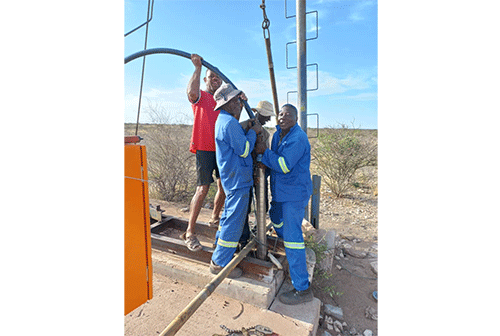Zebaldt Ngaruka
The rural water extension officer for the Epukiro constituency, Zebaldt Hangero, has advised villagers to brace themselves for a shortage of water this year as poor rainfall will have a negative impact on underground water reservoirs.
“This will be a big challenge, as borehole water comes from rain. The veld will be drying and livestock will need a lot of water,” he warned.
Consequently, Hangero urged the waterpoint committees in the constituency to deploy proactive approaches to avert a possible water crisis.
“The waterpoint committees must put mechanisms in place on how they are going to preserve water. They must make use of their laws like counting of livestock, budgeting for engine servicing and other measures on how to access water during difficult periods,” he added.
Hangero said the maintenance of water engines is important, and a special budget from the committees must be drawn up.
“Our government does not always have money to attend to all villages in terms of servicing engines. Villages must organise themselves and solve this problem,” he emphasised.
The extension officer furthermore told villages to help themselves with the transportation of water from one place to another, as the departmental trucks earmarked for that purpose have mechanical issues.
On the issue of water conflicts at waterpoints, he said laws put in place by the rural water supply department must always be followed.
“Communities must sit together and solve issues amicably. It is really not good to hear people fighting over water-related issues. The laws are clear, and leaders must teach their communities,” said Hangero.
He also suggested training for the waterpoint committee members and caretakers.
“These people need to be trained on various laws on how to govern these waterpoints. The caretakers must be trained technically on how to work with certain new engines, plus how to work with the solar system,” he continued.
Paul Kamuiingona, the agriculture ministry’s artisan foreman in the maintenance department in Omaheke, echoed similar sentiments, saying water scarcity is indeed a challenge in the region.
“Our trucks which are used in difficult periods are all at garages for mechanical repairs. Soon, we will get them as we receive money from our line ministry,” he added.
Kamuiingona likewise urged residents to preserve water while waiting for government assistance.
“We have installed solar panels in some villages, and caretakers need to show them. Thanks to those villages which are helping themselves with maintenance. This region is big, and sometimes we do not reach all corners where there are problems,” he stated.
– zngaruka@yahoo.com
* Zebaldt Ngaruka is a freelance journalist based in the Omaheke region.



